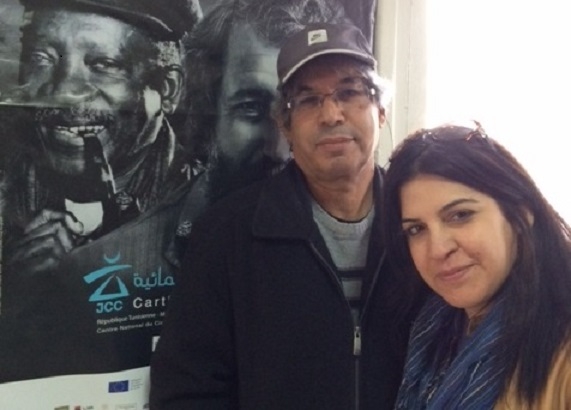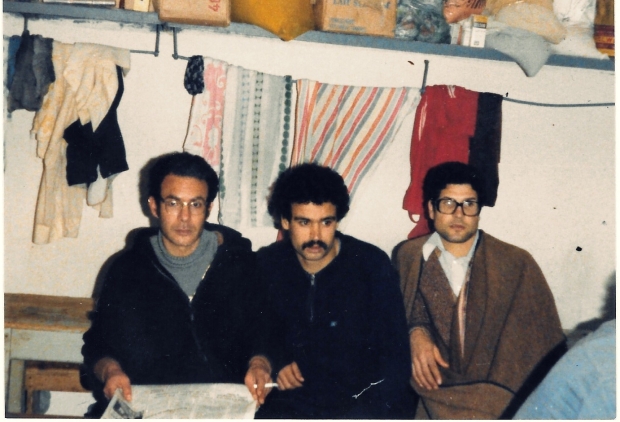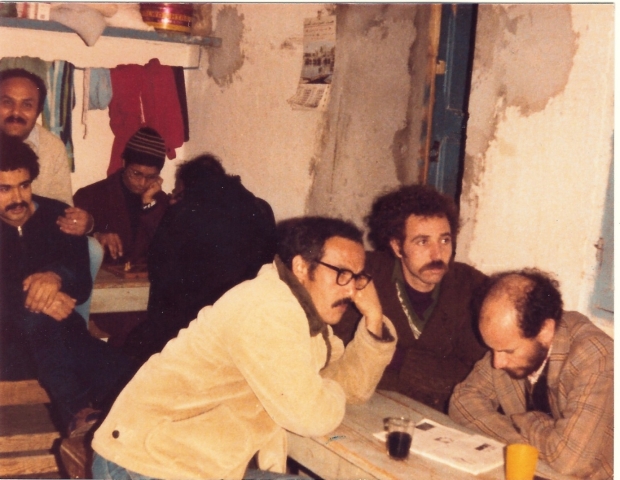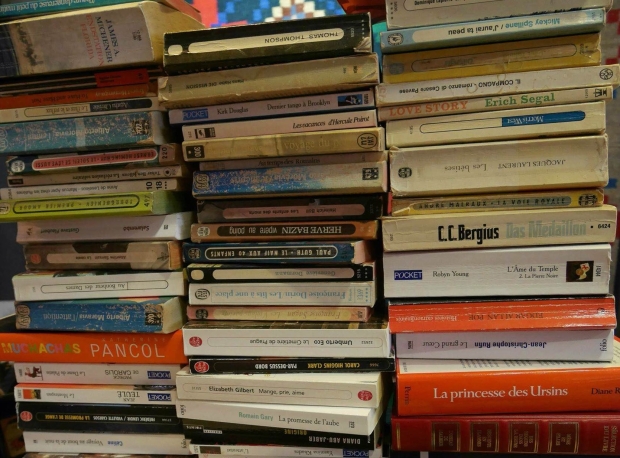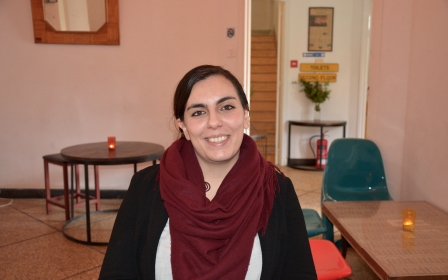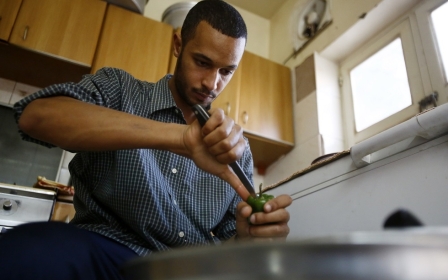A love letter to my father: The gift of reading for Tunisia's prisoners
Pictures of yellowed book paper flash across the projector screen as Lina Ben Mhenni addresses the crowd of young girls in front of her at the American Corner cultural centre in Tunis.
“These are my father’s books from prison. His friends signed them and gave them to him as presents,” she says. Fighting back her emotions, Ben Mhenni shares the story of her father’s seven-year-long imprisonment for political activism.
Normally, her natural confidence guides her easily through any presentation. However, only a few feet in front of her sits her father, the man whose story she is telling. Speaking about her father’s traumatic experience with him sitting in the audience brings everything full circle for her. After a moment, she takes a deep breath and continues with her talk about her latest initiative, one inspired by her father.
'Books to Prisons'
“Books to Prisons,” which aims to bring as many different types of books as possible to different prisons throughout Tunisia, is the brain-child of Ben Mhenni, the writer of the renowned blog “A Tunisian Girl,” and her father Sadok. The goal is to both counter the radicalisation of inmates and to provide some enjoyment to prisoners stuck behind bars.
Since the project’s launch on 11 February, Ben Mhenni has been travelling to different cultural centres, libraries and schools to present her new charity drive.
Her goal is to collect 15,000 books from around the country in order to deliver them to prisons throughout Tunisia. For Ben Mhenni, the cause is very important, since book reading was one of the main pastimes of her father while serving time in prison. Books were banned from the prison until he and his group of imprisoned friends went on hunger strike so their families would be allowed to bring in books.
Sadok still cherishes the books he read while imprisoned and keeps them on his bookshelf. In a sense, Ben Mhenni grew up surrounded by books that helped her father survive as a political dissident in Tunisia's prison.
We meet in a low-key cafe on a quiet corner of Tunis, not far from the hustle and bustle of downtown. Her boyfriend accompanies her, holding her hand intermittently throughout the interview.
“I managed to get rid of my police bodyguards for the day,” she tells me, as her lips curl upward. Asked why she believes she is so controversial and she responds, “Because I’m an independent woman, voicing my opinions on the news and at conferences. This upsets some people.”
Politically aware from a young age
Her story of activism started before she was born. “My father was imprisoned before my mum gave birth to me, so I grew up with him at home, after he had already finished his seven years in prison,” Ben Mhenni tells Middle East Eye.
After he was released, he remained politically active. As a young girl, Ben Mhenni learned from her father’s example. “When most other children were watching cartoons, I was watching the news with my father,” she reveals.
“I did all of my studies in Tunisia and in 2007, I started blogging. I was openly criticising the establishment,” she says.
In 2008, protests broke out in the mining governorate of Gafsa over perceived nepotism for new hirees. Ben Mhenni blogged about this protest movement under her own name. “This was the first time the government censored my posts,” she says.
She continued to blog and developed close ties to others in the blogging community. In May 2010, she and other bloggers planned a protest in downtown Tunis to speak out against censorship. Less than a week before the planned protest, unknown assailants broke into Ben Mhenni’s house. “They destroyed everything in sight. The message was clear: someone wanted me to shut up.”
Revolution
Despite the threat, Ben Mhenni and her fellow bloggers still went ahead with their protest. A few months later, Mohamed Bouazizi set himself on fire and demonstrations once again sprung up in a neglected interior city of Tunisia.
In an environment of abundant censorship, Ben Mhenni made sure to spread the message of Tunisian discontent to media outlets around the world. On 25 December, she organised a protest outside the Tunisian General Labour Union headquarters in Tunis. Once 2010 ended and the new year arrived, Ben Mhenni travelled to Kasserine to cover the protests sweeping across the city. She was one of the few independent media sources covering the protests and the eventual massacre of demonstrators.
This work brought her fame and a platform to promote the values of the Tunisian revolution, such as human rights and dignity. She was even nominated for the Nobel Prize in 2011. At the same time, her actions also put her on the radar of people with more nefarious ideas.
Number 1 on a kill list
Leftist politicians Chokri Belaid and Mohamed Brahmi were killed in February and July 2013 respectively. Their killers remain at large, but security analysts attribute their deaths to Ansar al-Sharia, a militant group which has elements throughout North Africa.
Only one week after the death of Brahmi, police knocked on the door of Ben Mhenni’s home to inform her that she would now require 24/7 armed protection. They informed her that she was “number 1 on a kill list” and that “plans have already been made” for her murder.
Despite not bringing her bodyguards along to our meeting in the cafe, Ben Mhenni says: “I still have them 24/7.” However, although her previous work may have upset some people, her current work has garnered essentially nothing but praise from not only Tunisians, but also from people around the globe. Her organisation has already received 6,000 books including a large shipment of books from a Swiss individual donating from abroad.
She has presented her charity plan on Dubai TV and her initial post on Facebook about the idea went viral. The only minor criticism she received was from some people who believe the books should be donated to hospitals and schools first. But for Ben Mhenni, prisons are the first priority.
“I visited the prisons and all of the books they have are religious fundamentalist books,” she tells Middle East Eye, “There’s no literature, philosophy or non-fiction.”
Prisons throughout Tunisia do have books and prisoners receive a list of which books are available and can choose what they would like to read. However, the options are quite limited. “We are accepting all books, regardless of language and genre,” she continues, “then the inmates can choose which ones they like and prefer.”
Overcrowding and mixed inmate communities
Ben Mhenni identifies two major problems with the prisons in Tunisia. “First, they are extremely overcrowded and operate at 200 percent capacity,” she says. “Furthermore, they mix prisoners. Someone who tries cannabis once may be in the same cell as someone who travelled to Syria to fight with ISIS.”
This second point is particularly relevant to what Tunisia is going through now. Although it has gotten somewhat less harsh, Tunisia’s law regarding cannabis consumption and possession is quite strict.
Previously, first time offenders would receive a year-long sentence and a fine of 1000 Tunisian dinar ($500), locally referred to as “a year and a Vespa”. This law has been transformed into a three-strike policy.
Still, many young men and women who are only minor criminals are put in prison. Once behind bars, they intermingle with hardline Salafists and members of militant organisations. Even if they choose to stay away from these types of people, the only reading option they have is of the religious fundamentalist genre.
Asked if she had any friends who were once "normal," went to prison, and then travelled to Syria to join ISIS. She pauses and then says, “You know the Tunisian rapper Emino? I used to correspond with him before he went to prison. He was totally normal.” Prompted as to what happened to him next she elaborates, “Then he failed a drug test and got sent to prison. Once he was released, he was a totally different person. He started messaging me to criticise the clothes I was wearing and said that I wasn’t acting appropriately. I had to block him after that.” Emino later travelled to Syria and joined ISIS. No one I have talked to knows whether he is dead or alive.
Ben Mhenni believes her charity can specifically target this group of relatively harmless young men in prison for minor offences and help them maintain more moderate outlooks on life. One could argue that without Tunisia’s Draconian drug laws, Emino might never have become radicalised. Still, the reality is that these laws exist and, until they are fully amended, activists like Ben Mhenni are looking for solutions. Increasing the popularity of more mainstream books amongst prisoners is seen by many as a definite step in the right direction.
Potential for success
According to UNHCHR statistics of Tunisian prisons, 55 percent of prisoners are between the ages of 18 and 29, 50 percent have finished primary school, and more than 50 percent are imprisoned for drug offences. Looking at these numbers, a few conclusions can be drawn. The prisoners are mostly young and poorly educated, making them particularly impressionable to both moderate and radical strains of thought.
Luckily for Ben Mhenni and her charity plan, 50 percent of the prison population has learned how to read at least at the primary school level, while others are even more advanced. Therefore, many of the inmates can actually improve their literacy through the programme. With only four percent of prisoners illiterate, the odds of success are high.
Ben Mhenni estimates that the books donated are probably around 50 percent in French, 30 percent in English and 20 percent in Arabic. It is estimated that over 60 percent of the Tunisian population speaks French. Half of the country's newspapers are in French, while the other half are in Arabic. Students in public school learn English starting in the fifth grade and it is growing greatly in popularity, but Arabic and French are still the dominant languages.
Asked why so many of the donated books are in French, Lina explained that it's "because the people who donated the books read in French. If you checked my bookcase or my parents', you will find that most of the books are in French. I think there are many Tunisians who prefer to read in French."
Ben Mhenni has high hopes for the success of this project. Since more than 50 percent of prisoners are imprisoned for drug offences, mostly of a relatively minor nature, and the offenders still have their whole lives ahead of them, she believes the Books to Prisons scheme has a good chance of helping them to get back on track.
“We hosted a screening of a Moroccan movie from last year’s Carthage Film Festival and they were very excited about it. They kept asking questions about other movies,” she tells me, “For the screening, we specifically chose young people and drug offenders because we think we can do the best work with them.”
When she visited different prisons around Tunisia, she was impressed with how much the inmates knew about what was happening outside. “They have at least one TV in each cell and are allowed to watch pre-screened series and news at designated times,” which is an improvement.
Short-term pessimism, long term hope
Lina Ben Mhenni is doing her best to make a difference in Tunisia one step at a time. She is proud of her charity’s successes so far and hopes to continue making incremental, yet significant changes in the way that inmates are treated. In terms of her overall outlook on post-revolution Tunisia, she tries to keep things in perspective.
“I am definitely pessimistic in the short-term, but optimistic for the long-term,” she tells MEE. “I am very proud of the revolution. We have made so many changes happen that not everyone can see because they are usually intangible. But we still need to make real efforts toward future positive change. This is just one step in that direction.”
This article is available in French on Middle East Eye French edition.
Middle East Eye propose une couverture et une analyse indépendantes et incomparables du Moyen-Orient, de l’Afrique du Nord et d’autres régions du monde. Pour en savoir plus sur la reprise de ce contenu et les frais qui s’appliquent, veuillez remplir ce formulaire [en anglais]. Pour en savoir plus sur MEE, cliquez ici [en anglais].


